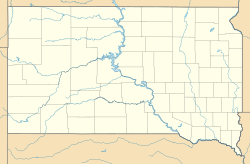Daneville Township Bridge No. E-26 facts for kids
Quick facts for kids |
|
|
Daneville Township Bridge No. E-26
|
|
| Nearest city | Viborg, South Dakota |
|---|---|
| Area | less than one acre |
| Built | 1935 |
| Built by | Turner County Highway Department; Federal Emergency Relief Administration |
| Architectural style | Stone arch |
| NRHP reference No. | 99001441 |
| Added to NRHP | December 9, 1999 |
The Daneville Township Bridge No. E-26 is a special stone bridge in the countryside of Turner County, South Dakota. It crosses a small stream on 457th Avenue, south of Viborg.
This bridge was built in 1935. It is one of many bridges in the area that were built with money from a government program called the New Deal. The New Deal helped people find jobs during a difficult time in history. Because it is an important historical site, the bridge was added to the National Register of Historic Places in 1999. This list helps protect important places across the United States.
What Does the Daneville Township Bridge Look Like?
The Daneville Township Bridge is in western Turner County, about 6 miles (10 km) south of Viborg. It carries 457th Avenue, which is a dirt road, over a small stream.
It is a small bridge made of stone with a single arch. The arch is about 8 feet (2.4 meters) long and 3 feet 6 inches (1.1 meters) high. On each side of the arch, there is a stone wall that rises above it. These walls extend outwards like wings. The bridge is built from local stone called quartzite. The top edges of the walls are covered with concrete.
How Was This Bridge Built?
This bridge is one of 180 stone arch bridges built in Turner County. They were all part of a federal jobs program during the New Deal era. This program helped people get jobs during the Great Depression.
The county government found it cheaper to build stone bridges than steel ones. This was because there were many skilled stone workers available. Also, the government helped pay their wages. The county was in charge of the work crews and provided the building materials. This particular bridge was built in 1935 by a county team. You can even see the year carved into its side! It followed a standard design used by the state.



